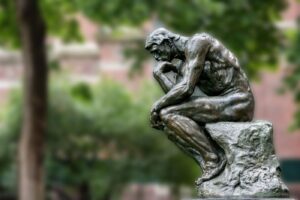Family decline appears to be inevitable when viewed with a long perspective. The family has been progressively differentiated from institutions that now accomplish what was formerly within the provenance of the family. The city’s gods, and eventually the Church, replaced ancestral gods. The marketplace, and eventually the modern economy, replaced the family as the unit of economic production. The city replaced primitive patriarchy. Slowly, and more controversially, the state has come to fulfill increasing portions of the family’s educational mission. Even the family’s “provision of social services” has come, more and more, to be a state concern. This “loss of functions” is a rational application of the division of labor, as functions extraneous to family life devolve in the presence of institutions better suited to accomplish these goals. As the family loses more and more functions, its purposes become thinner but, it is hoped, truer to the reality of what a family is.
This stripping of functions is also, however, cause for serious worry, for the functions of the family can almost always be exported to other institutions or arrangements or the need for them can seem to disappear from human life altogether. We must know what constitutes the family’s end or purpose lest we face the ultimate in family decline.
The “loss of function,” afoot, in some sense, since pre-classical times, has accelerated due to two powerful intellectual movements. First, the idea of marriage as a contract, derived from modernity’s overriding concern with personal liberty, has successively thinned the family to the point that marriage and family life are, from the standpoint of public philosophy, seriously under-employed. Early liberal thinkers, such as John Locke, thought the chief end of marriage was the procreation and education of children. For Locke, the heterosexual, conjugal family best prepares children for self-government in a free society (and much social science data still confirm Locke’s argument). Since this is the case, Locke held that the public could supervise and encourage what came to be called the bourgeois family form and require that parents stay together until their children reach the age of maturity.
As successive theorists called into question whether Locke had accurately apprehended the function of marriage, they also called into question its form. Liberal and radical theorists, such as John Stuart Mill and some of today’s feminist thinkers, suggested that marriage could take on whatever function the marital partners choose. It is with the family in mind that Mill recommends “different experiments of living” and counsels that “different persons . . . require different conditions for their spiritual development.” The failure to impute a function to marriage meant that the public would have to open up the question of form, requiring public approval of either different or more diverse forms, or, perhaps, no form at all. Even those defending marriage and family life in the modern world, such as French sociologist Emile Durkheim, writing around 1900, thought that the family was too emotionally intense and that parents were too partisan on behalf of their children to be entrusted with the moral education of the young. Durkheim ended up defending the two-parent heterosexual family as the most effective means of taming the man’s sexual passion and directing his otherwise socially disruptive desire for the infinite.
Mill’s advocacy on behalf of the private definition of contract, combined with Durkheim’s willingness to export the family’s educative function to the state, seriously undermined any case for the public supervision of the marriage contract, and it prepared the ground for an acceleration of the exportation of functions from the family. Durkheim and Mill both focused the attention of family on the married adults, tending to strip functions related to the upbringing of children from the family’s domain. The only remnant of state recognition—in the name of cultivating self-control among males—was a thin reed on which to defend family life, especially in the face of Freudian theory (which called into question the goodness of self-control) and feminism (which questioned whether marriage was good for woman).
Start your day with Public Discourse
Sign up and get our daily essays sent straight to your inbox.Today’s theorists impute to marriage squishy, individualistic functions—such things as achieving personal fulfillment or sharing access to social services—in order to show that any form will do, so long as individuals consent to it. Originally, the public helped shape family form by aligning it with the procreative and educative function, but over time intellectuals thought that these functions were better conducted elsewhere or that these functions were really tools of oppression, and thus these same intellectuals accepted many forms of marriage and family life. This move from the public definition of the contract to the private definition of contract seems to be the natural outgrowth of the individualistic principles that justified the original idea of marriage as a contract.
The family’s loss of functions is connected to a second, deeper intellectual trend in modernity: the movement to conquer nature. The household arises due to the natural and inescapable facts of life—the utter dependence of children on parental support and the need for a mother to support and receive protection from a father. Yet human beings are not enslaved to their biology: the borders of what constitutes a natural imperative have changed as human beings have sought to increase their empire over nature, and have invented new modes to deal with the natural imperatives of age and sex difference. Seeking to show that these two imperatives are not as imperial as people first thought, modern thinkers re-design the household in different ways. This effort begins, again, with Locke, who exhorts people to free themselves from the imperatives to which nature seems to have consigned human relations. Among the “almost natural” institutions that Locke would have human beings shed is patriarchal government and pain in childbirth. Subsequent thinkers, particularly Mill, emphasize the social construction of gender, seeing natural sex differences as tools invented to keep women in a state of slavery. Later waves of feminist thinkers worked out his logic, showing that fathers and mothers were positively harmful in their effects on children or, at least, were replaceable by other institutions, especially the state as a provider of care. The effort to see sex differences as artificial led to the need to reinvent institutions to handle the difficulties of age difference.
These profound intellectual trends have affected how men and women view themselves and view children and childbearing. The logic of contract has culminated in a triumph of autonomy. The movement to conquer nature promotes greater gender equality as an exercise in autonomy. Institutions buckle things together, suggesting that they have a necessary or salutary relation to one another, and both these trends reflect the modern penchant for separating what institutions once united. Marriage and family life had, among other things, buckled love and marriage, marriage and parenthood, parenthood and sex, marriage and sex, and sex and procreation together. Every modern defender of some family form ends up defending, in one way or another, various connections among these goods; the more radical the critics of the family are, the more buckles they seek to loosen.
Today we face the possibility of the family’s end, in part because of the attractive promise to free us from the buckles that nature seems to place on our freedom. The erosion of these buckles explains, in no small part, the amazing decline in birth rates seen across the Western world. Encapsulating all of these separations in one fell swoop is the move for public recognition for same-sex marriage, as it is the victory of the adult-centered marriage contract to secure whatever goods the adults choose, and is the final detachment of marriage and family life from nature. The question is, then, what is to be done?
Scott Yenor is Associate Professor and Chair of Political Science at Boise State University. This article is drawn partly from his book Family Politics: The Idea of Marriage in Modern Political Thought (February 2011).










